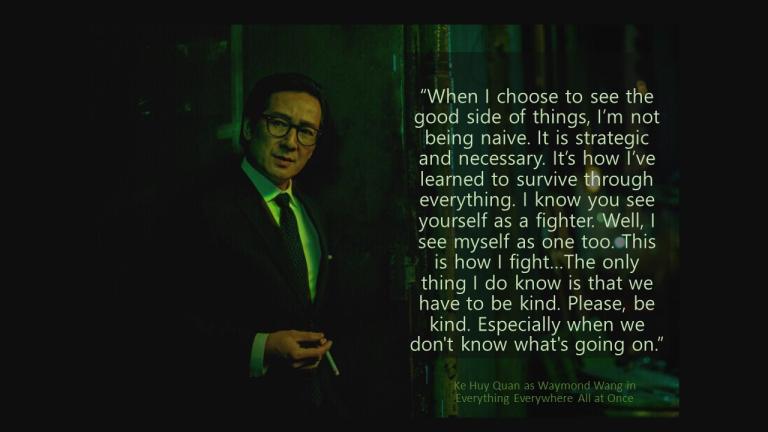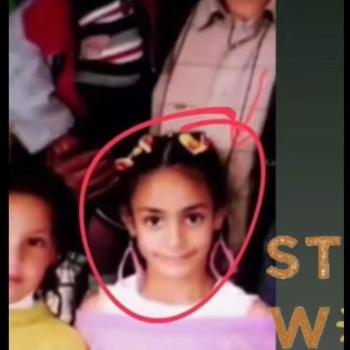
Everything Everywhere All At Once is a very strange movie. It has a sheer silliness about it, so much so that there were moments when I wasn’t sure I liked it. Yet there was a sense of something profound beneath the surface, much as is also true of The Good Place. So I kept watching and am glad I did. The end of the movie is surprisingly moving, and the message of the film is truly profound and challenging. For parents it is especially relevant and powerful. I trust that I can say that without giving away too much. There are some minor spoilers in what follows, and I certainly don’t want to rob the film of the chance to surprise you with the power of its final act. I’ll leave it up to you whether to read on or not.
For me the most powerful moment in the film is when a central yet supporting character articulates his approach to life. I am referring to Waymond Wang who is the husband of the protagonist Evelyn Wang in the universe the story begins in, although the words that I found so poignant are voiced by him in a universe where Evelyn didn’t leave home to marry Waymond against her father’s wishes. They reconnect after he has been financially fortunate on his own in the United States while she has become a movie star back home in China. As she talks about another life in which they went off together, his response still brings a lump to my throat: “In another life, I would have really liked just doing laundry and taxes with you.”
But my favorite line is the one I turned into a meme here because it deserves to circulate widely. “You tell me that it’s a cruel world, and we’re all just running around in circles. I know that. I’ve been on this earth just as many days as you. When I choose to see the good side of things, I’m not being naïve. It’s strategic and necessary. It’s how I’ve learned to survive through everything. I know you see yourself as a fighter. Well, I see myself as one too. This is how I fight.” That sums up how I want to approach life. As Waymond adds, the key thing is that we have to be kind.
In her review of the movie, Aanya Sawhney sums up what the film’s message is that sets it apart from others:
“Everything Everywhere All at Once” does not tell you that love is the answer.
Because for Evelyn, even love wasn’t enough.
Instead, it is choosing kindness and choosing joy that is the answer to the absurdity of life.
As someone who has taught a core curriculum course unit about China ancient and modern, I appreciated some of the Daoist themes and symbolism that run through the film. The movie also raises what I consider the most profound philosophical conundrums pertaining to the idea of an infinite multiverse. What is the point of making good choices or doing right actions if there are always infinite versions of you making every other choice by definition? I’m not sure there is an infinite multiverse and so the question is purely hypothetical. But if we discovered that there is, the possible ethical ramifications would be huge. At that point I’ll recommend revisiting this movie which provides an answer. We don’t find meaning in an infinite multiverse. We make meaning. We do it by making surprising choices, above all else choosing to love, to connect, to sacrifice, to see the positive in the midst of everything that is negative, and yes, choosing to be kind.
Have you seen Everything Everywhere All At Once? If so, what did you think of it? Did the silliness seem too much and prevent the movie from also being deep and emotionally moving for you? Or were you, like me, able to appreciate it as a parable, a pop culture comedic way of articulating important moral convictions and values? If your impression was negative, I’ll suggest that you look past the implausibility and at times crude humor and consider how the final “fight” scene differs from the climactic final fight seen in just about every other movie.
Also about Everything Everywhere All At Once:
“This Is How I Fight”: Learning Kindness in Everything Everywhere All at Once

















